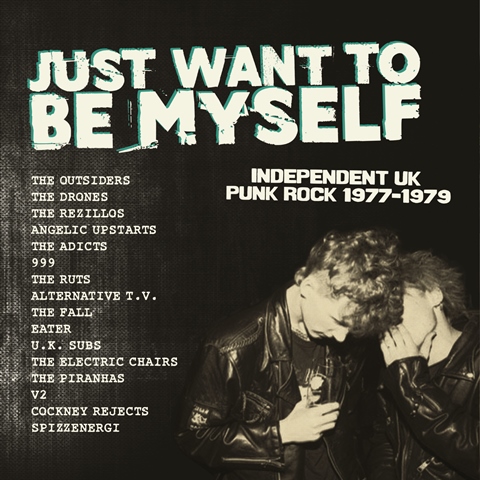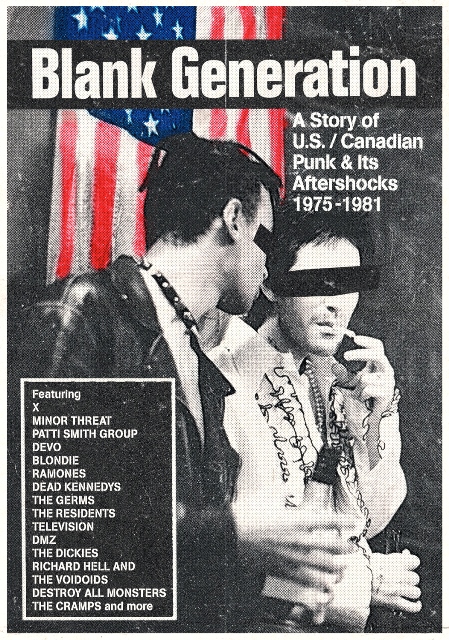“I hate it, so I guess Eater have succeeded.” NME’s March 1977 appraisal of the debut single by UK punk's teen sensations was direct. In his trailblazing British punk fanzine Sniffin' Glue, Mark Perry was equally forthright when contemplating “Outside View.” “Sorry lads but this single is crap,” he wrote. “It’s not even good crap, it’s just a waste of time.”
Eater’s first single has become the opening track of Just Want To Be Myself: UK Punk Rock 1977–1979, a 32-track double album which almost – as some of the tracks aren’t really punk – does what its title says. Evidently, one era’s crap can later become another’s essential musical nugget.
 Just Want To Be Myself takes its title from a track by Manchester’s The Drones. As a single, and as “I Just Want To Be Myself,” it was given fair consideration by Sounds which generously pointed to “a mid-period Bowie flavour. If you like Generation X’s single, you’ll like this a lot too.” The album version, without the “I” in its title, kicks-off Side Two.
Just Want To Be Myself takes its title from a track by Manchester’s The Drones. As a single, and as “I Just Want To Be Myself,” it was given fair consideration by Sounds which generously pointed to “a mid-period Bowie flavour. If you like Generation X’s single, you’ll like this a lot too.” The album version, without the “I” in its title, kicks-off Side Two.
While it was pretty easy to dismiss what the guttersnipes on the UK’s doorsteps were up to, looking from over here at the US brought what was being branded as punk a form of cool – the distance, the remove helped. A viewpoint still borne-out by the whopping 132-track, five-disc casebound set Blank Generation: A Story Of US / Canadian Punk and its Aftershocks 1975–1981. Its first two-and-a-half discs cover 1975 to 1978, and what’s heard is frequently artier, better played and less adherent to evolving templates than what is on Just Want To Be Myself. The three opening tracks are Richard Hell & the Voidoids’s “Blank Generation,” The Ramones’s “Rockaway Beach” and Television’s “Friction.” Big names and heavy hitters sit alongside lesser lights.
The UK collection is about reactions to punk and, according to its promotional material, celebrates “the birth of independent punk rock in the UK.” The US collection is, its promo material says, a “comprehensive, big-tent look at the early years of punk rock in the US and Canada.” In its book, compiler Jon Harrison says “I hope Blank Generation succeeds as a series of mix tapes that capture the almost unbearably sweet excitement of discovering this music.”
Although there are slightly differing remits, each collection does what these sorts of thing should always seek to do: to put a shape on something which may or may not have been previously delineated. And with punk, a yen to delineate in different ways began the moment the word was bandied around in relation to a contemporary music and style. The earliest historiography of this particular notion of punk is stuffed with overt and less explicit bracketing.
 In New York, Punk magazine arrived in shops in January 1976. Anyone in its pages was going to be tarred as punk. The first issue of Sniffin' Glue arrived in late July 1976: it was, according to its cover “For Punks.” The UK music weeklies swiftly came on board, and beyond looking at individual bands and noting the emergence of a scene, identified a British punk in August 1976 – the word had been around, but in Melody Maker that month Caroline Coon wielded the definitive designation. Over four decades later, Just Want To Be Myself and Blank Generation attest to the on-going aliveness of this desire to characterise what may already have been characterised beyond any point of necessity. Nonetheless, each collection has an enviable freshness despite the bad breath exuded by much of what’s heard.
In New York, Punk magazine arrived in shops in January 1976. Anyone in its pages was going to be tarred as punk. The first issue of Sniffin' Glue arrived in late July 1976: it was, according to its cover “For Punks.” The UK music weeklies swiftly came on board, and beyond looking at individual bands and noting the emergence of a scene, identified a British punk in August 1976 – the word had been around, but in Melody Maker that month Caroline Coon wielded the definitive designation. Over four decades later, Just Want To Be Myself and Blank Generation attest to the on-going aliveness of this desire to characterise what may already have been characterised beyond any point of necessity. Nonetheless, each collection has an enviable freshness despite the bad breath exuded by much of what’s heard.
Nothing on Just Want To Be Myself will be unfamiliar to those acquainted with the well being drawn from. The most obscure cut is “A.C.A.B.” by The Rowdies, taken from a July 1978 EP. The title is not its guitar chords, but short for “All Coppers Are Bastards.” Elsewhere, wonderful offerings like The Rezillos's “I Can’t Stand my Baby,” Puncture’s “Mucky Pup,” Maniacs’s “Chelsea 77,” Angelic Upstarts’s “The Murder of Liddle Towers,” U.K. Subs’s “C.I.D.” and, less punkily, ‘O’ Level’s “Pseudo Punk,” The Piranhas’s “Jilly” and The Fall’s “Psycho Mafia.” This brush paints broad strokes. A great listen.
In its way, the mind-bogglingly expansive Blank Generation seeks to be a catalogue raisonné of the compiler's mind-set. Beginning with Hell and co's agenda-setting “Blank Generation” makes sense, as does ending with the benchmark hardcore of Minor Threat’s eponymous 1981 track from their important first EP. Between, some tracks which few people will have heard of: Alda Reserve’s “Cure me” (1979), Count Vertigo’s “I’m a Mutant” (1979) and Chandra’s “Kate” (1980) amongst them. Including representatives of what would become the Paisley Underground is interesting, though The Dream Syndicate’s “When You Smile” is from 1982, outside the stated date range. And in the book, some of the pics of bands are skewwhiff: the line ups of The Heartbreakers and Pere Ubu seen are not as per those playing what’s heard. However, Blank Generation is extraordinary, going way further than anything along these lines has gone before - e.g.: Rhino’s 2003 world-wide punk box No Thanks! and the 2007 set Babylon's Burning - The Rough 'n' Ready Rise Of Punk Rawk 1973-1978.
The unstated question raised by both collections is whether the world needs further looks at punk? After taking them in, the answer is yes. Go for Just Want To Be Myself: UK Punk Rock 1977–1979 as an engaging one-stop snapshot of punk-era – though not necessarily punk-for-real – waywardness. The deep-digging, painstakingly ambitious, wide-ranging and thought-provoking Blank Generation: A Story Of US / Canadian Punk and its Aftershocks 1975–1981 is an essential inventory of North America’s path through punk, new wave and the related evolutionary strands.
- Next week: A Midsummer’s Day Dream – Mark Eric’s Brian Wilson-esque album from 1969
- More reissue reviews on theartsdesk
- Kieron Tyler’s website















Add comment